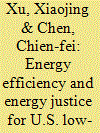|
|
|
Sort Order |
|
|
|
Items / Page
|
|
|
|
|
|
|
| Srl | Item |
| 1 |
ID:
162285


|
|
|
|
|
| Summary/Abstract |
Recent broad-based deployment of Advanced Metering Infrastructure (AMI) enables the opportunity for broader adoption of time-based rates, and the benefits that result have been sizable contributors to making the investments cost effective. However, some stakeholders have raised concerns about the assumptions underlying the benefits assessments in AMI business cases. Such concerns are especially acute for certain subpopulations of residential customers. Low income, elderly and chronically ill (i.e., vulnerable) customers are believed to have less load that can be shifted or reduced to capture bill savings, lack the know-how or wherewithal with which to curtail usage, likely have more limited financial resources which may compel them to avoid high priced periods by reducing electricity for essential usage potentially causing them physical harm, and more generally may be more adversely affected by higher bills, which might possibly result from certain forms of time-based rates. There is very limited existing literature that addresses these questions specifically with regard to vulnerable subpopulations. This paper, based on a larger report, extends the existing empirical literature on the experiences of low-income customers exposed to critical peak pricing, and provides the first glimpses into the experiences of the elderly and those who reported being chronically ill.
|
|
|
|
|
|
|
|
|
|
|
|
|
|
|
|
| 2 |
ID:
166347


|
|
|
|
|
| Summary/Abstract |
Energy poverty intertwines with the issues of energy inequality and energy justice, presenting a particular challenge for low-income households (LIHs). This study explores energy justice in the U.S. through the lens of several interconnected questions: Do energy assistance programs have adequate participation rates? How accessible are energy efficiency (EE) appliances? Are there different energy practices across income groups? How does time schedule of energy practices differ across income groups, and how is it connected to energy demand flexibility? Based on two representative data sets, this study finds that affordability and accessibility remain serious problems for LIHs. LIHs have lower participation rates in many EE programs and own fewer EE appliances and smart grid technologies. Additionally, thermostat control strategies are different across income levels. LIHs tend to set one fixed temperature, even when they own a programmable thermostat, which is less energy efficient. LIHs engage in more energy practices throughout the daytime than their counterparts and show the least pronounced morning and evening peaks, indicating a relatively inflexible schedule and barriers to accepting demand response programs. This study concludes with policy implications for making energy more affordable, accessible, flexible, and better for the environment, while being fair to those often underserved.
|
|
|
|
|
|
|
|
|
|
|
|
|
|
|
|
| 3 |
ID:
119912


|
|
|
|
|
| Publication |
2012.
|
| Summary/Abstract |
In a recent article in Time, former United States president Bill Clinton lists five global phenomena as cause for optimism, beginning with the assertion that "phones mean freedom." Clinton explains that mobile phones "foster equality" and have "revolutionized the average person's access to financial opportunity," citing a 2010 UN study that found that mobile phones are "one of the most effective advancements in history to lift people out of poverty." To expand on Clinton's important observations, it is notable that the device that "fosters equality" and "lift[s] people out of poverty" is by and large provided by entrepreneurs and businesses seeking to make a profit.
|
|
|
|
|
|
|
|
|
|
|
|
|
|
|
|
|
|
|
|
|